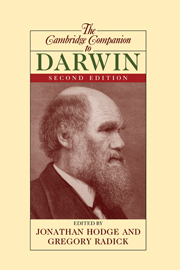Book contents
- Frontmatter
- Introduction
- Part I Darwin’s theorising
- Part II Historical contexts
- Part III Current issues
- 11 From Darwin to today in evolutionary biology
- 12 Metaphysical and epistemological issues in modern Darwinian theory
- 13 Darwinian concepts in the philosophy of mind
- 14 Darwinism in moral philosophy and social theory
- 15 Belief in God in a Darwinian age
- Part IV Philosphical prospects
- Guide to further reading
- List of references
- Index
14 - Darwinism in moral philosophy and social theory
from Part III - Current issues
Published online by Cambridge University Press: 28 May 2009
- Frontmatter
- Introduction
- Part I Darwin’s theorising
- Part II Historical contexts
- Part III Current issues
- 11 From Darwin to today in evolutionary biology
- 12 Metaphysical and epistemological issues in modern Darwinian theory
- 13 Darwinian concepts in the philosophy of mind
- 14 Darwinism in moral philosophy and social theory
- 15 Belief in God in a Darwinian age
- Part IV Philosphical prospects
- Guide to further reading
- List of references
- Index
Summary
Among philosophers, naturalism is the view that contemporary scientific theory is the source of solutions to philosophical problems. Naturalists look to the theory of natural selection as a primary resource in coming to solve philosophical problems raised by human affairs in particular. For the theory combines relevance to human affairs and scientific warrant more strongly than does any other theory. Theories in physics and chemistry may be more strongly confirmed, especially because their more precise predictions can be tested in real time. But these theories have little to tell us about human conduct and institutions. On the other hand, actual and possible theories in the social and behavioural sciences may in the future have more to tell us about humanity than Darwinian theory; but these theories do not as yet have anything like the degree of confirmation of Darwin's theory. This chapter surveys contemporary strategies for providing a Darwinian understanding and vindication of morality, ethical norms, our conception of justice, and the cooperative human institutions which those norms and conceptions underlie. We will see that while the prospects for a Darwinian vindication of moral claims - as true or well founded - remain clouded, the prospects for explaining the normative dimension of human affairs by appeal to Darwinism appear to be improving.
- Type
- Chapter
- Information
- The Cambridge Companion to Darwin , pp. 345 - 367Publisher: Cambridge University PressPrint publication year: 2009

